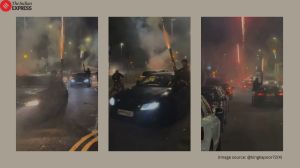Advani silences party hawks, stands solidly behind Mufti
Denying allegations of ‘‘lack of coordination’’ between the Centre and the J&K government and rebuffing charges made by ...

Denying allegations of ‘‘lack of coordination’’ between the Centre and the J&K government and rebuffing charges made by BJP and Shiv Sena MPs against the role of the Mufti Sayeed government, Deputy Prime Minister L K Advani today asserted in the Lok Sabha that there was ‘‘absolutely no difference’’ between the Centre and the state when it came to the question of development and security of Jammu & Kashmir.
Replying to a discussion on the terrorist attack on Vaishno Devi pilgrims at Katra last night and the strike at an army camp in the Akhnoor sector this morning—the discussion took place as soon as the House assembled this morning, displacing the customary Question Hour—Advani said these attacks were clearly aimed at disturbing the growing normalcy in the state.
Echoing the view expressed by several members in course of the discussion, Advani said the PM’s historic visit to Srinagar, the conclave of Congress chief ministers in town, the president’s visit and the huge increase in tourists visiting the Valley were all pointers to the improvement witnessed in the state in recent months.
Heeding the warning made by MPs who spoke before him, Advani said despite these positive factors ‘‘there was no room for complacency.’’ The Centre and the state government would continue its anti-terrorist drive but at the same time the larger message that normalcy had returned to the troubled state should not be lost.
Advani’s speech was significant for its note of warmth towards the regime in J&K. He referred to the ‘‘free and fair’’ elections that ushered in the PDP-Congress coalition as ‘‘a turning point’’ in the state’s history.
In contrast to BJP members who have been critical of the state government’s ‘‘healing touch’’ policy, Advani said: ‘‘Let’s not fight over words—we feel that the commitment of the state government to fight terrorism in the state is no less than that of the Centre.’’
This was in sharp contrast to speeches made by BJP chief whip V K Malhotra, Shiv Sena leader Chandrakant Khaire, and National Conference chief Omar Abdullah. Malhotra accused the opposition of ‘‘politicising’’ the issue and hinted that the Sayeed government’s policy of releasing militants may have aided terrorism in the state.
Omar Abdullah said both the state and the central government ‘‘are to blame for complacency’’ and lack of coordination. He said the surface normalcy was giving a false sense of security—the militants were only lying low, they hadn’t gone away.
In keeping with his party line, Khaire took an extreme view and said the J&K police were not be trusted and Central forces should take over the security of the state.
All others who took part in the discussion underlined that on the question of national security, they fully backed the government and condemned the terrorist attack ‘‘in one voice.’’





- 01
- 02
- 03
- 04
- 05


























